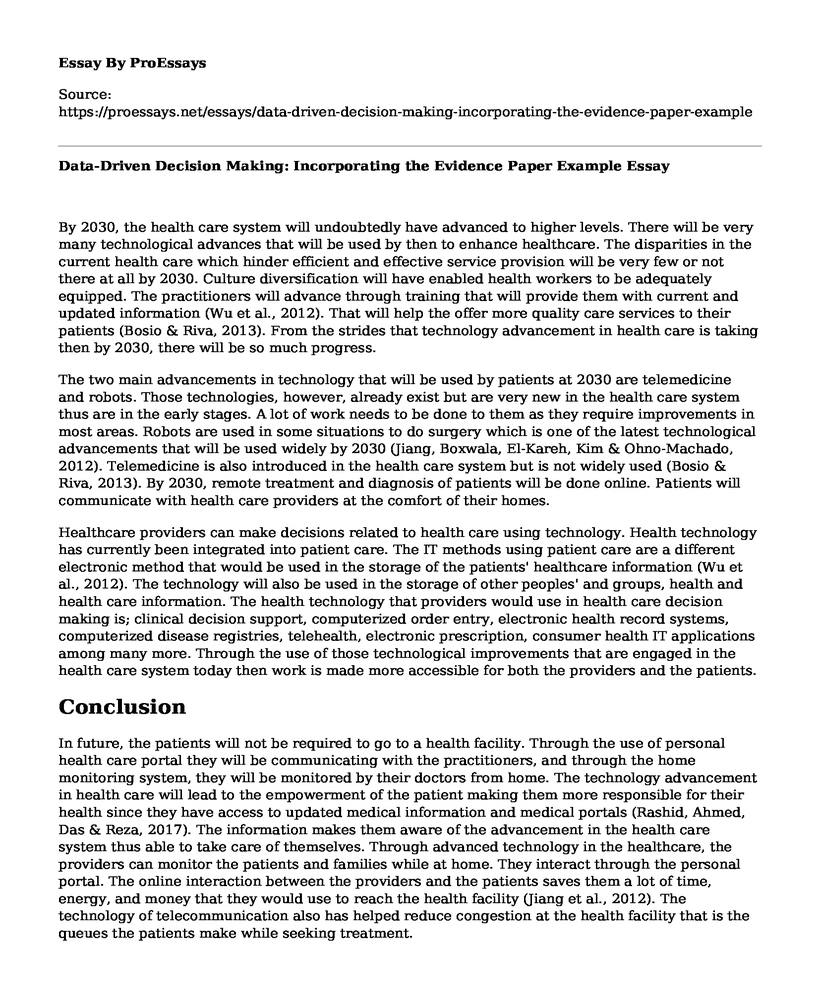By 2030, the health care system will undoubtedly have advanced to higher levels. There will be very many technological advances that will be used by then to enhance healthcare. The disparities in the current health care which hinder efficient and effective service provision will be very few or not there at all by 2030. Culture diversification will have enabled health workers to be adequately equipped. The practitioners will advance through training that will provide them with current and updated information (Wu et al., 2012). That will help the offer more quality care services to their patients (Bosio & Riva, 2013). From the strides that technology advancement in health care is taking then by 2030, there will be so much progress.
The two main advancements in technology that will be used by patients at 2030 are telemedicine and robots. Those technologies, however, already exist but are very new in the health care system thus are in the early stages. A lot of work needs to be done to them as they require improvements in most areas. Robots are used in some situations to do surgery which is one of the latest technological advancements that will be used widely by 2030 (Jiang, Boxwala, El-Kareh, Kim & Ohno-Machado, 2012). Telemedicine is also introduced in the health care system but is not widely used (Bosio & Riva, 2013). By 2030, remote treatment and diagnosis of patients will be done online. Patients will communicate with health care providers at the comfort of their homes.
Healthcare providers can make decisions related to health care using technology. Health technology has currently been integrated into patient care. The IT methods using patient care are a different electronic method that would be used in the storage of the patients' healthcare information (Wu et al., 2012). The technology will also be used in the storage of other peoples' and groups, health and health care information. The health technology that providers would use in health care decision making is; clinical decision support, computerized order entry, electronic health record systems, computerized disease registries, telehealth, electronic prescription, consumer health IT applications among many more. Through the use of those technological improvements that are engaged in the health care system today then work is made more accessible for both the providers and the patients.
Conclusion
In future, the patients will not be required to go to a health facility. Through the use of personal health care portal they will be communicating with the practitioners, and through the home monitoring system, they will be monitored by their doctors from home. The technology advancement in health care will lead to the empowerment of the patient making them more responsible for their health since they have access to updated medical information and medical portals (Rashid, Ahmed, Das & Reza, 2017). The information makes them aware of the advancement in the health care system thus able to take care of themselves. Through advanced technology in the healthcare, the providers can monitor the patients and families while at home. They interact through the personal portal. The online interaction between the providers and the patients saves them a lot of time, energy, and money that they would use to reach the health facility (Jiang et al., 2012). The technology of telecommunication also has helped reduce congestion at the health facility that is the queues the patients make while seeking treatment.
References
Bosio, c., & Riva G. (2013). Positive technology as a driver for health engagement. Annual Review of Cybertherapy and Telemedicine 2013: Positive Technology and Health Engagement for Healthy Living and Active Ageing, 191, 9.
Jiang, X., Boxwala, A. A., El-Kareh, R., Kim, J., & Ohno-Machado, L. (2012). A patient-driven adaptive prediction technique to improve personalized risk estimation for clinical decision support. Journal of the American Medical Informatics Association, 19(e1), e137-e144.
Rashid, H., Ahmed, I. U., Das, R., & Reza, S. M. T. (2017, January). Emergency Wireless Health Monitoring System using Wearable Technology for Refugee Camp and Disaster Affected People. In International Conference on Computer, Communication, Chemical, Materials and Electronic Engineering IC4ME2-2017 (pp. 144-147).
Wu, R. C., Tran, K., Lo, V., O'Leary, K. J., Morra, D., Quan, S. D., & Perrier, L. (2012). Effects of clinical communication interventions in hospitals: a systematic review of information and communication technology adoptions for improved communication between clinicians. International journal of medical informatics, 81(11), 723-732.
Cite this page
Data-Driven Decision Making: Incorporating the Evidence Paper Example. (2022, Sep 22). Retrieved from https://proessays.net/essays/data-driven-decision-making-incorporating-the-evidence-paper-example
If you are the original author of this essay and no longer wish to have it published on the ProEssays website, please click below to request its removal:
- The Correlation Between Urban Growth in Term of Population and Obesity in the United States
- Roger's Theory as a Nurse Facilitator Paper Example
- Essay Sample on Human Resource Information System
- Essay Example on America: Tech-Savvy Health Care for All?
- Essay Example on Professional Nursing Association: Benefits & Impact
- Native Americans: Dietitians for Healthy Lifestyles - Paper Sample
- Lead Analyst's Challenge: Persuading Stakeholders With Data - Free Report Example







